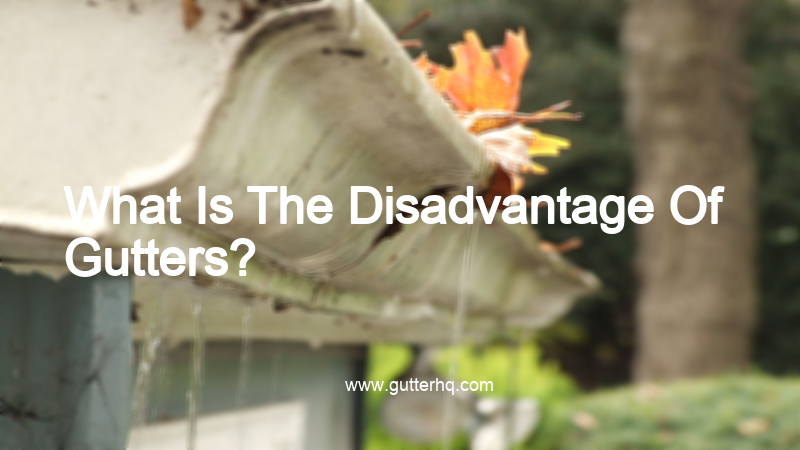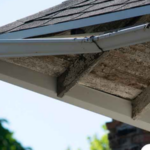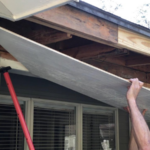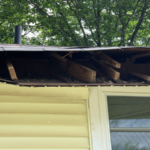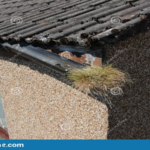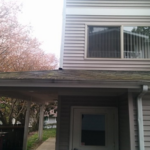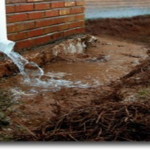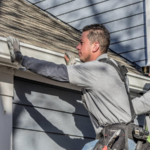One of the primary disadvantages of gutters is that they can be quite expensive to install, especially if your home doesn’t already have them. In addition, gutters require regular maintenance and cleaning in order to prevent leaves and other debris from clogging them and causing water to back up and potentially damage your home. Finally, gutters can be aesthetically unpleasing, especially if they’re not properly maintained, and can detract from the overall curb appeal of your home.
Is it better to have gutters or not?
There are a few things to consider when making the decision of whether or not to install gutters on your home. The first is the climate. If you live in an area with a lot of rainfall, gutters can help to keep your home from sustaining water damage. They can also help to prevent flooding in your basement or crawl space. If you live in an area with little rainfall, however, gutters may not be necessary.
Another consideration is the type of home you have. If you have a home with a pitched roof, gutters can help to direct water away from your foundation and prevent it from seeping into your basement or crawl space. If you have a flat roof, however, gutters may not be as effective.
Finally, you should also consider the cost of installing gutters. If you are handy and have the time, you may be able to install gutters yourself, which can save you a significant amount of money. If you hire someone to install gutters for you, the cost will be higher, but you may be able to get a discount if you have the gutters installed as part of a larger home improvement project.
Why would you not put gutters on a house?
There are a few reasons why someone might choose not to install gutters on their house. One reason could be that they live in an area with very little rainfall and they don’t feel the need for them. Another reason could be that they like the look of their house without gutters and don’t want to change it. Finally, gutters can be costly to install and maintain, so some people simply don’t want to make the investment.
What is the most common problem with gutters?
One of the most common problems with gutters is that they can become clogged with leaves, twigs, and other debris. If gutters are not cleaned out on a regular basis, this can cause water to back up and overflow, which can lead to serious damage to your home.
What are the cons of not having gutters?
If your home doesn’t have gutters, you may be at risk for a number of problems. First, if rainwater is allowed to fall directly from the roof onto the ground next to your home, it can cause serious foundation issues. When the ground around your home becomes saturated with water, it can cause the foundation to settle or even crack. In addition, gutters can help protect your home’s siding and windows from water damage. If water is allowed to run down the side of your home, it can cause the siding to rot or the paint to peel. In extreme cases, it can even cause windows to leak or break.
Why do Florida houses not have gutters?
There are a few reasons for this. One is that the weather in Florida is mostly warm and sunny, so there is not as much need for gutters to protect the house from water damage. Another reason is that gutters can be a source of leaks and water damage, so many homeowners in Florida choose to not have them.
Should I put gutters around the whole house?
There are a few things to consider when deciding if you should put gutters around your whole house. The first is the climate. If you live in an area with a lot of rainfall, gutters can help protect your home from water damage. The second is the type of home you have. If you have a brick home, gutters can help prevent water from seeping into the bricks and causing damage. The third is the type of roof you have. If you have a shingled roof, gutters can help prevent water from damaging the shingles. If you have a metal roof, gutters can help prevent rust. The fourth is the size of your home. If you have a large home, gutters can help prevent water from pooled around the foundation and causing damage. The fifth is the type of foundation you have. If you have a concrete foundation, gutters can help prevent water from seeping into the concrete and causing damage.
So, should you put gutters around your whole house? It depends on your individual situation. If you live in an area with a lot of rainfall, or if you have a brick home, a shingled roof, or a metal roof, gutters can be a good idea. If you have a large home or a concrete foundation, gutters can also be a good idea.
Do gutters cause roof damage?
The answer is a resounding no. Your gutters are not the cause of your roof damage. In fact, they are there to protect your roof from damage. Water damage is the leading cause of roof damage, and gutters help to prevent this by channeling water away from your roof. If your gutters are not properly maintained, however, they can become clogged with debris, which can lead to water damage.
What is the best gutter to put on your house?
There are many types of gutters to choose from when it comes to your home. However, the best gutter to put on your house would be a seamless gutter. Seamless gutters are less likely to leak and cause water damage to your home. They are also easier to clean and maintain than traditional gutters.
How do you handle rain runoff without gutters?
- Install a rain diverter on your roof: A rain diverter is a simple device that helps to redirect rainwater away from your home.
- Collect rainwater in rain barrels: Barrels can be placed underneath your rain gutters to collect rainwater. This water can be used for watering your plants or washing your car.
- Use rain gardens: Rain gardens are planted areas that are designed to absorb rainwater. They can be used to beautify your yard while also helping to reduce runoff.
- Install a French drain: A French drain is a trench that is filled with gravel or other material. It is used to redirect water away from areas that are prone to flooding.
- Cover exposed soil: Exposed soil can be covered with mulch, straw, or other material. This will help to reduce erosion and prevent rainwater from running off of your property.
Conclusion
There are a few disadvantages of gutters, including the potential for leaks, blockages, and costly repairs. However, these problems can usually be avoided with proper maintenance and regular cleaning. Overall, gutters are a great way to protect your home from water damage and keep your landscaping looking its best.
